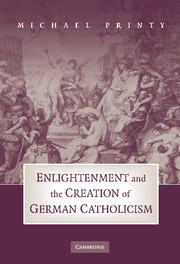Book contents
- Frontmatter
- Contents
- Acknowledgments
- 1 Introduction
- Part One PERFECT SOCIETIES: RETHINKING THE CHURCH AND THE STATE
- Part Two THE UNIVERSAL CHURCH AND THE UNIVERSAL CLASS
- 6 Catholic Enlightenment and the Search for a Bourgeois Catholicism
- 7 A Program for Reform
- 8 Pastors of Enlightenment: Reforming the Secular Clergy
- 9 Gallican Longings: Nation and Religion in the German Enlightenment
- 10 Conclusion
- Bibliography
- Index
9 - Gallican Longings: Nation and Religion in the German Enlightenment
Published online by Cambridge University Press: 02 July 2009
- Frontmatter
- Contents
- Acknowledgments
- 1 Introduction
- Part One PERFECT SOCIETIES: RETHINKING THE CHURCH AND THE STATE
- Part Two THE UNIVERSAL CHURCH AND THE UNIVERSAL CLASS
- 6 Catholic Enlightenment and the Search for a Bourgeois Catholicism
- 7 A Program for Reform
- 8 Pastors of Enlightenment: Reforming the Secular Clergy
- 9 Gallican Longings: Nation and Religion in the German Enlightenment
- 10 Conclusion
- Bibliography
- Index
Summary
As discussed in an earlier chapter, the intense interest in pre-Reformation canon law and the idealization of the fifteenth century as failed moment for a German national church played a central role in the arguments of the German canon lawyers intent on establishing jurisdictional autonomy from Rome. This Gallican idea, as it evolved into the eighteenth century, assumed that the church played a central role in politics and society. The Catholic reform program assumed a sense of responsibility and leadership for the German church. Formed as it was by the church, the German Catholic bourgeoisie felt an obligation to tie the Catholic past with a Catholic future. Because the German church had not succeeded in securing the rights and liberties that its French counterpart had (as early as the fifteenth century), German Catholics could pin their hopes for moral and intellectual leadership of the church on an imagined future legal autonomy in ways that French Catholics did not.
This process of rethinking took place within a larger debate about the German nation that intensified with the Seven Years’ War and its aftermath. This debate was pushed further along by the Carl Friedrich von Moser's pamphlet on the “German National Spirit,” published in 1765, which argued that Germans needed to cultivate a sense of nationhood to overcome their weaknesses and divisions.
- Type
- Chapter
- Information
- Enlightenment and the Creation of German Catholicism , pp. 185 - 211Publisher: Cambridge University PressPrint publication year: 2009
- 1
- Cited by

